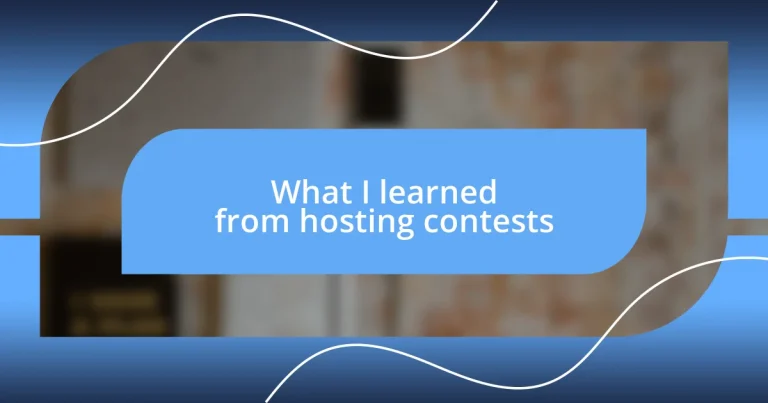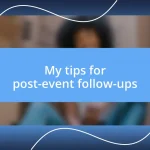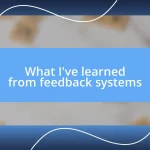Key takeaways:
- Community engagement enhances the contest experience, fostering meaningful connections among participants.
- Effective preparation, including clear guidelines and understanding the audience, is crucial for a successful contest.
- Feedback and continuous improvement are essential for future contests, encouraging growth through structured insights and participant involvement.
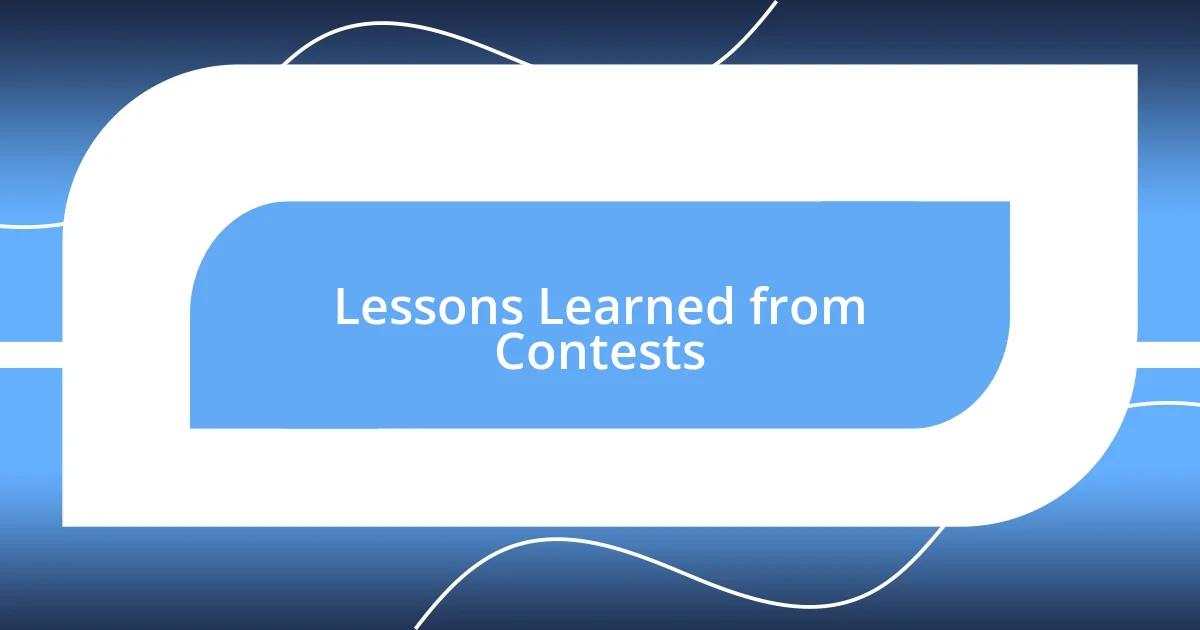
Lessons Learned from Contests
Hosting contests has taught me the immense value of community engagement. During one contest, participants began sharing not just their submissions but personal stories and experiences related to the theme. It struck me how a simple competition could foster such meaningful connections. Have you ever felt that sense of belonging?
I’ve also learned that flexibility is vital. In one instance, technical difficulties threatened to derail an entire event. Rather than panicking, I quickly adapted the rules, allowing contestants to submit entries via video instead of the usual format. This unexpected change not only salvaged the contest but also led to a unique and creative wave of entries. Isn’t it fascinating how challenges can propel us into new territories?
Another important lesson is the necessity of clear communication. After one contest, feedback revealed that some guidelines were ambiguous, leading to confusion among participants. I realized how crucial it is to communicate expectations clearly—it’s like providing a roadmap to creativity. How do you think clarity influences participation in competitions?
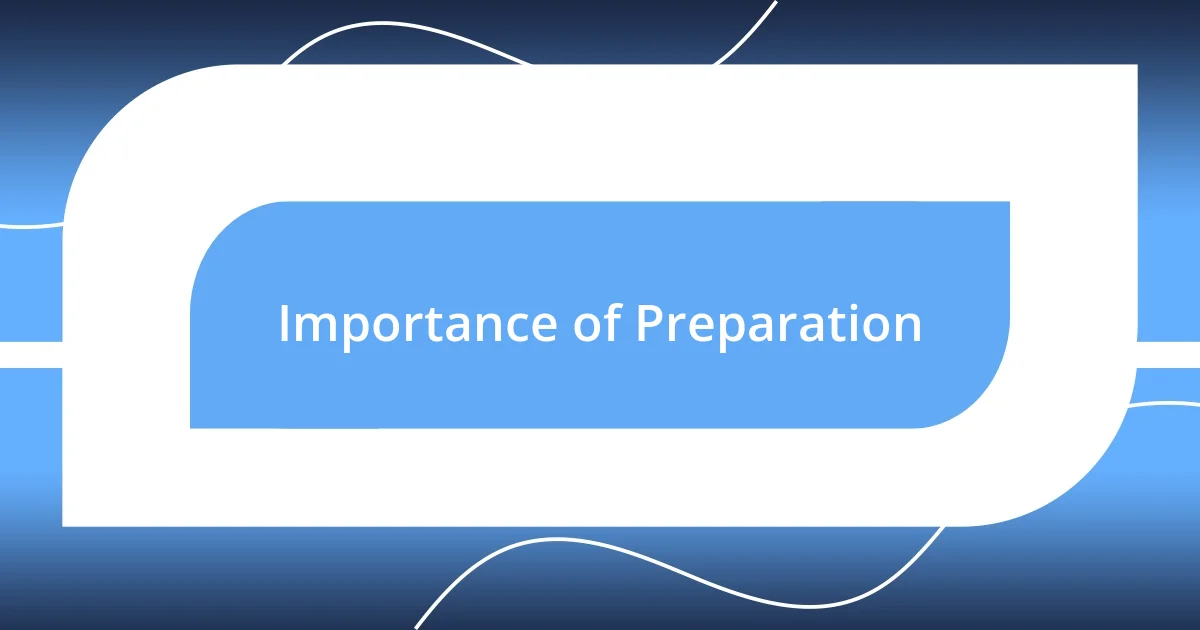
Importance of Preparation
Preparation is the backbone of any successful contest. I’ve experienced firsthand that when I invest time in planning, the entire event flows much more smoothly. There have been instances where I overlooked minor details, only to be met with confusion on the day of the contest, which was quite disheartening. It reminded me that neglecting preparation is like setting off on a journey without a map—you might reach a destination, but not without a few wrong turns.
- Define clear contest rules and guidelines.
- Create a checklist for the event day to avoid last-minute surprises.
- Anticipate potential technical issues and have backup plans ready.
- Promote the contest effectively to attract the right audience.
- Collect feedback beforehand to address any concerns or questions.
Another valuable aspect of preparation is understanding the audience. I once hosted a photography contest and realized too late that I hadn’t tailored the theme to resonate with participants’ interests. The entries were sparse, and those I received lacked passion. It was a wake-up call; I now always engage with my community before designing contests. By knowing what excites them, I can create experiences that truly connect. Have you ever felt the difference when an event reflects the interests of its participants?
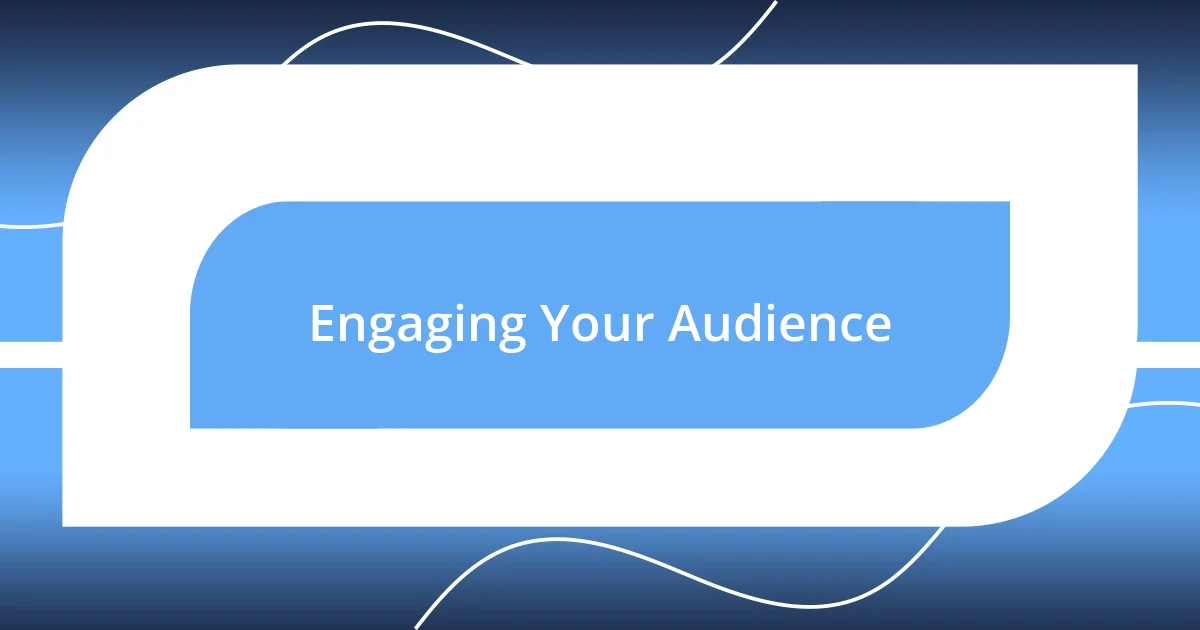
Engaging Your Audience
Engaging your audience is essential for the success of any contest. I remember one contest where I encouraged participants to share their progress on social media. The excitement was palpable as submissions rolled in, accompanied by enthusiastic posts. It transformed the event into a vibrant conversation, where not just participants, but even onlookers felt invested. Isn’t it remarkable how sharing experiences can create a collective sense of achievement?
Another important facet I learned is the power of interactive elements. In a recent writing contest, I introduced live Q&A sessions with judges. Participants eagerly engaged, asking questions and sharing insights in real time. This interaction not only enriched their experience but also led to better submissions. It’s fascinating how an open dialogue can deepen connections and boost creativity. Have you ever felt more involved when your voice is heard in an event?
To illustrate these findings further, I’ve created a comparison table that highlights various strategies for audience engagement and their impact:
| Strategy | Impact |
|---|---|
| Social Media Interaction | Creates a dynamic conversation and community support. |
| Live Q&A Sessions | Fosters deeper connections and encourages creativity. |
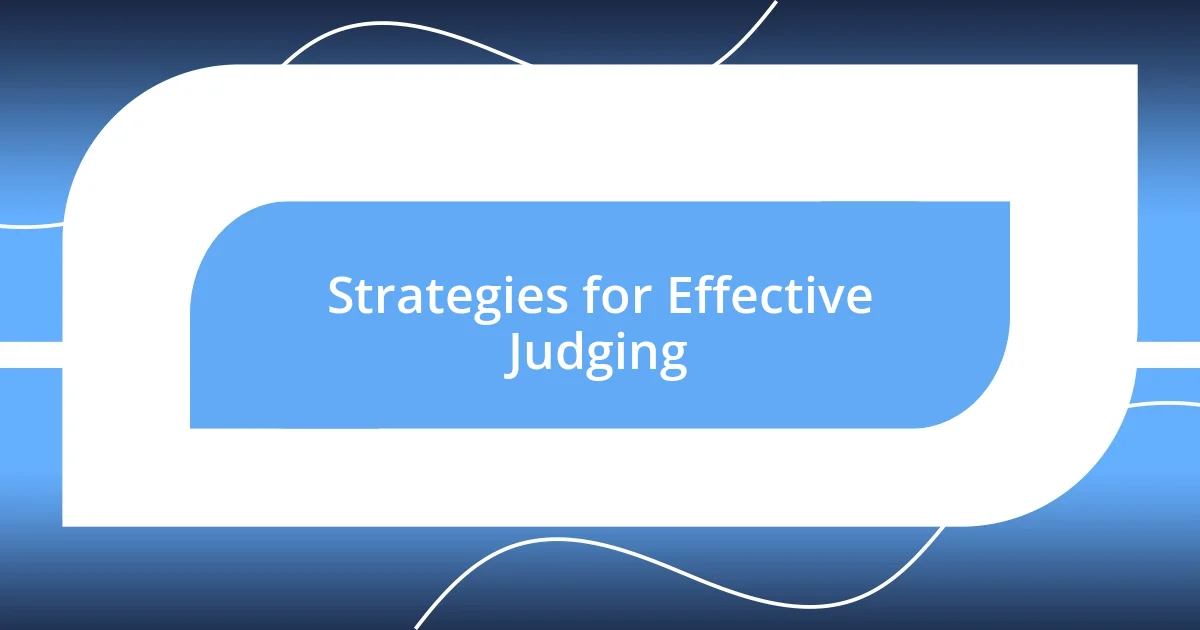
Strategies for Effective Judging
One important strategy for effective judging is to establish clear criteria ahead of time. I remember when I was judging a cooking contest and had to decide between two fantastic dishes; without a solid framework, I felt lost and stressed. Set specific metrics, like creativity, presentation, and taste, so that judging becomes more straightforward. Isn’t it reassuring to have a roadmap when faced with tough decisions?
Additionally, communicating effectively with fellow judges during the contest is crucial. In a recent art competition, we created a shared scorecard that allowed us to discuss our thoughts after each submission. This collaboration led to more balanced assessments, as we could challenge each other’s perspectives constructively. Have you ever had a conversation that completely changed your viewpoint? It’s fascinating how dialogue can enhance understanding.
Finally, soliciting feedback from participants post-judging can be incredibly insightful. After I judged a local poetry contest, I received messages from contestants expressing gratitude for the feedback, but also shared their confusion about the scoring. I realized that transparency in my judging process could turn those moments into learning experiences for everyone involved. How can we improve if we don’t open the floor for conversation?
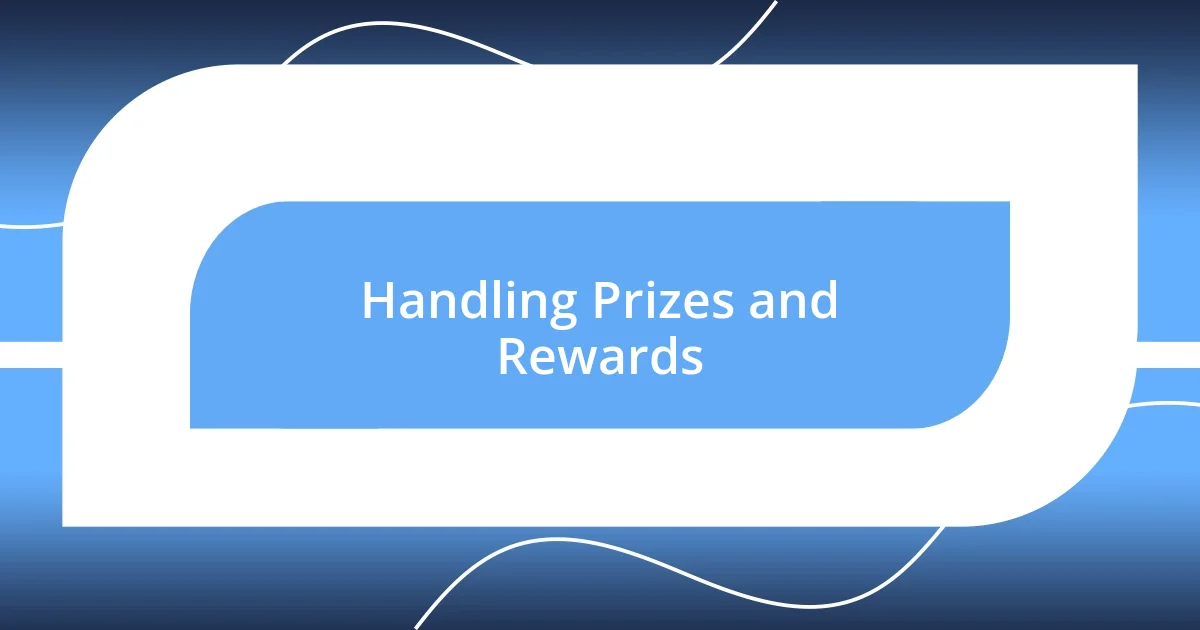
Handling Prizes and Rewards
Handling prizes and rewards can sometimes be a tricky endeavor. I’ve found that giving thoughtful consideration to what you offer can deeply enhance the overall experience. One time, I decided to surprise the winners of an online contest with personalized gifts related to their submissions, and the joy I saw on their faces was priceless. Isn’t it amazing how a small, personal touch can elevate a reward from simple recognition to a cherished memory?
Another crucial aspect is setting clear expectations about what winners will receive. In a recent photography contest, I outlined not just the prizes, but also how and when they would be distributed. This transparency built trust and excitement among participants. Have you ever felt let down when you weren’t sure about the outcome of a contest? Clarity can go a long way in ensuring everyone feels valued and informed.
It’s not just about the tangible rewards, though; the experience of winning should feel meaningful. In one contest, I invited participants to an award ceremony where winners shared their stories and inspirations. The emotional connections made that day lingered far beyond the announcements. Isn’t it fascinating how celebrating achievements can foster a stronger community? Making these moments special helps everyone feel like a winner in their own right.
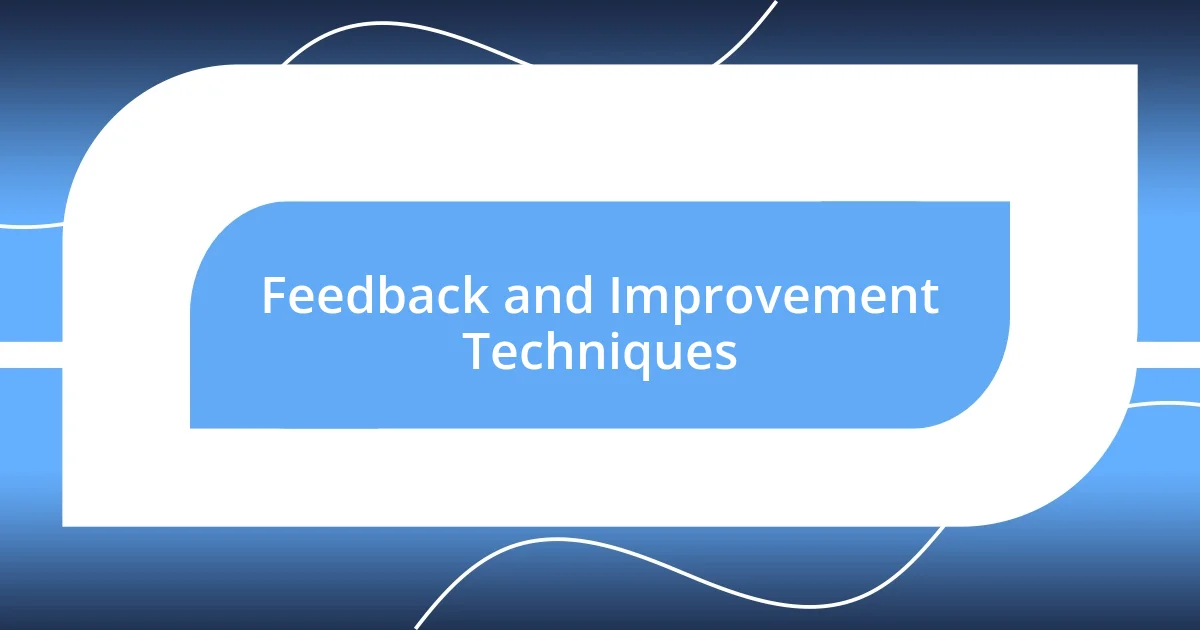
Feedback and Improvement Techniques
When it comes to feedback, I’ve learned that timing is everything. I once hosted a contest where feedback was delivered immediately after the judges’ deliberation, which seemed helpful at first. However, my participants were often too emotional or distracted to absorb what was said. Now, I encourage reflection time before sharing feedback. Have you experienced a moment when you needed a breather to truly hear someone’s perspective? This shift has made all the difference.
I also discovered the power of structured feedback forms. In one contest, I used a simple template that prompted specific insights—positive and constructive. The detailed nature of these forms not only made it easier for me to provide valuable advice but also helped participants see their strengths alongside areas for growth. Isn’t it fascinating how a little structure can transform a potentially overwhelming process? Participants appreciated the clarity it added to their experience.
Lastly, creating a feedback loop is vital for continuous improvement. After I hosted a series of contests, I started sending out surveys to gather insights from both participants and judges. Although responses could be hard to digest at times, the collective feedback offered me actionable steps to enhance future events. Have you ever received criticism that, while tough to hear, pushed you to grow? I’ve embraced this mindset, realizing that each piece of feedback is a stepping stone toward hosting even better contests.
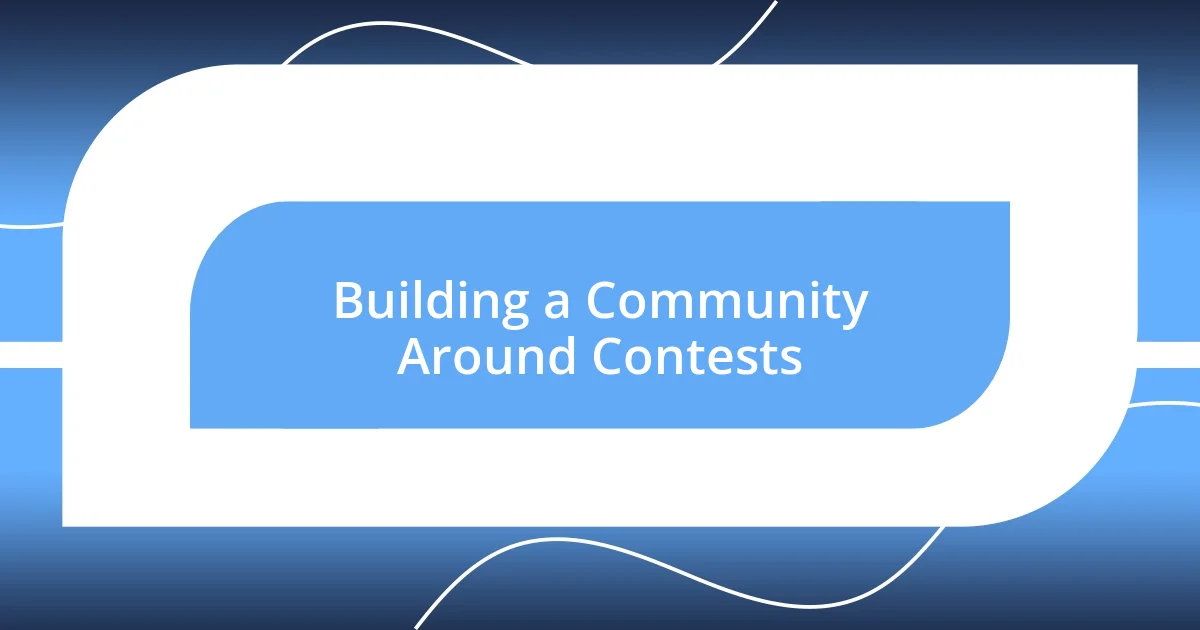
Building a Community Around Contests
Building a sense of community around contests is something I’ve truly enjoyed. One rewarding experience was when I organized a writing contest that encouraged participants to share their creative processes in a dedicated online forum. Watching the discussions unfold was invigorating; writers started exchanging tips, providing encouragement, and even forming collaborations. Isn’t it fulfilling when participants bond over shared passions?
Often, I’ve noticed that fostering an inclusive atmosphere can significantly enhance community engagement. During another contest, I invited past contestants to return as guest judges, allowing them to share their insights with newcomers. The result? A vibrant dialogue that made veterans feel valued and inspired newer participants. Have you ever experienced the warmth of mentorship? It truly builds a sense of belonging and growth.
I also believe that regular engagement beyond the contests is vital for nurturing community ties. After one art competition, I hosted a virtual showcase where participants shared their works and stories. The highlight? The heartfelt conversations that sprang up as artists discussed their inspirations. It reinforced my belief that a true community thrives on connection, not just competition. Who doesn’t want to be part of something where every voice is welcomed and celebrated?












